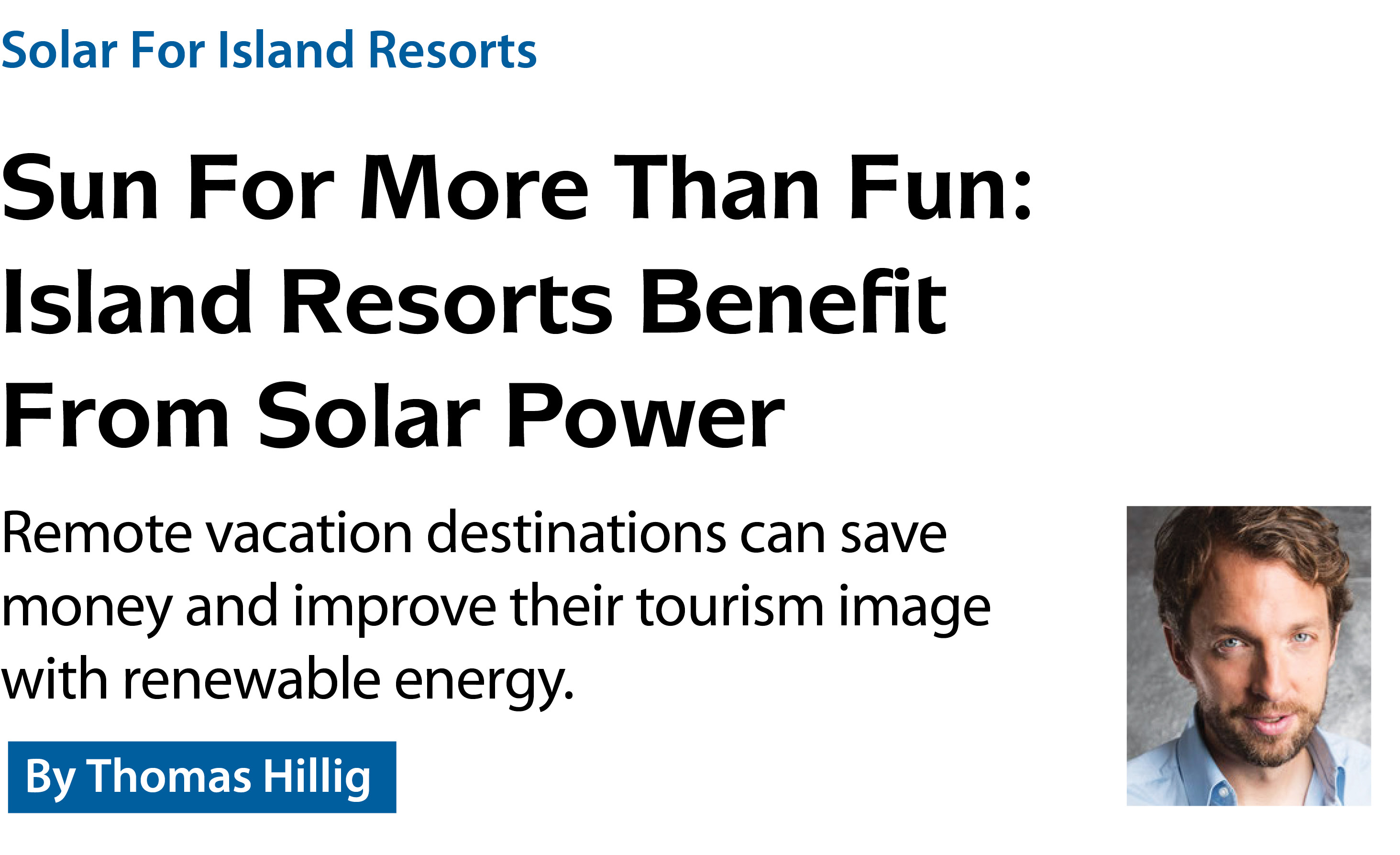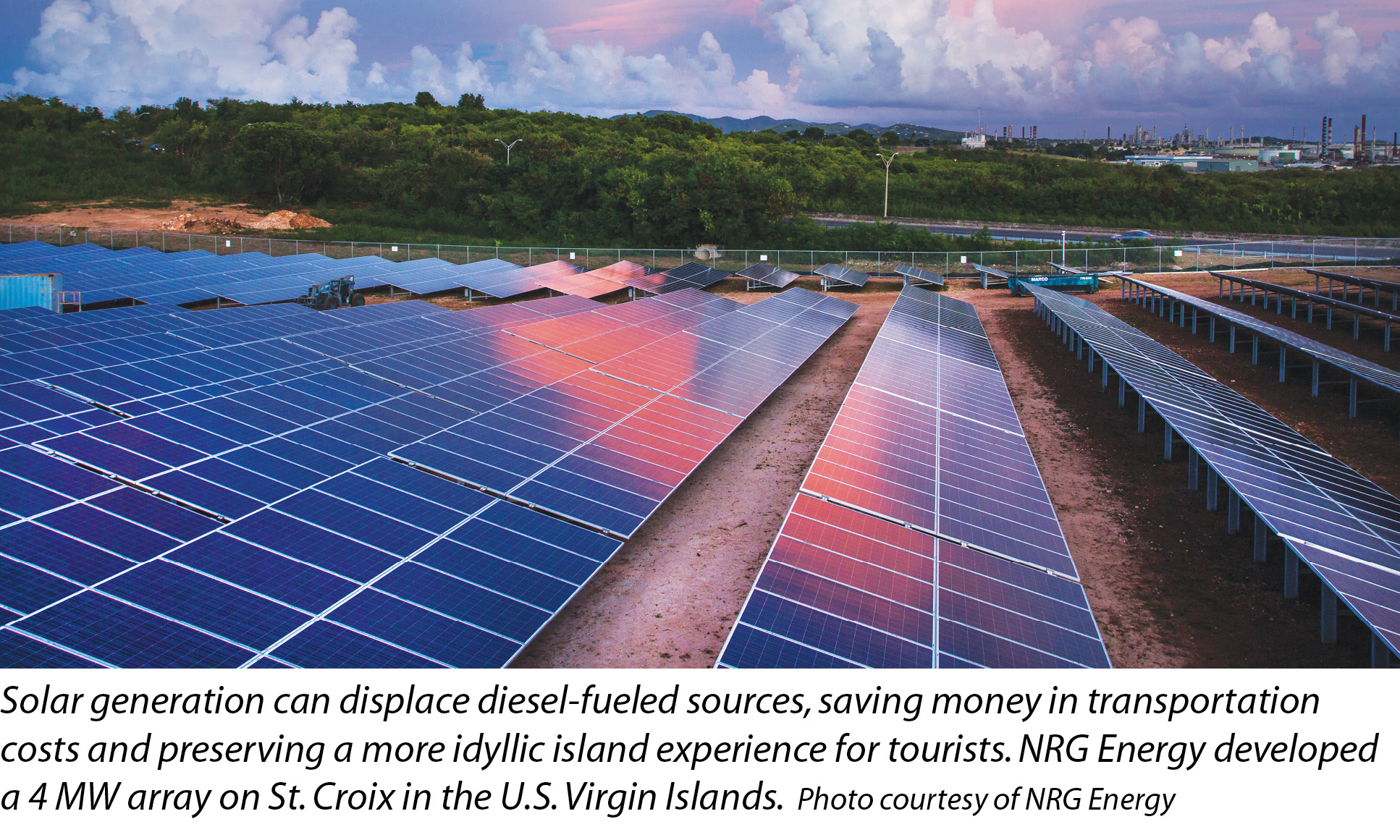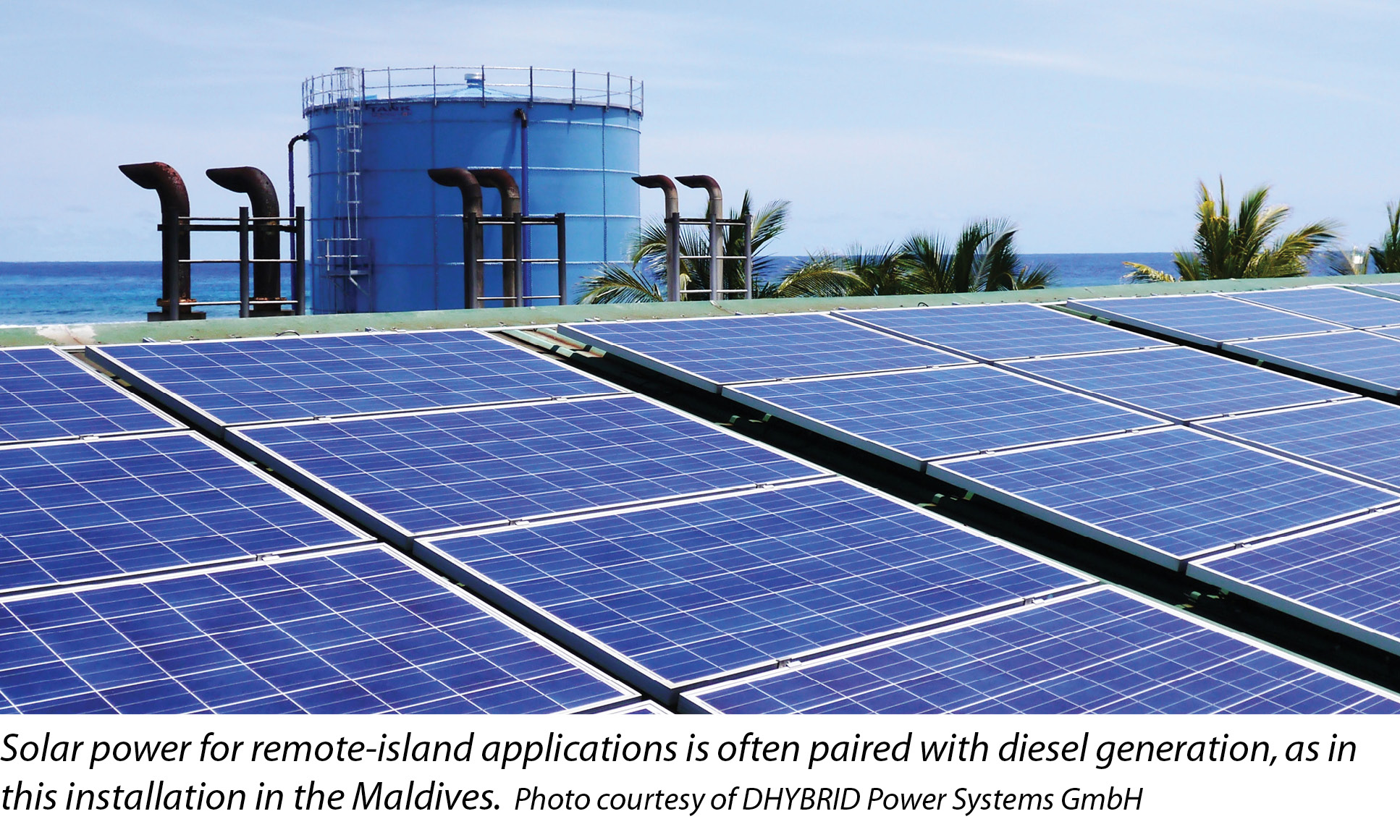

301 Moved Permanently
Many of the most exclusive hotels and resorts are located on islands. Luxury tourists seek pristine landscapes and are willing to pay a premium for hotels and resorts in these unique locations. Isolated settings have many advantages, but they also create significant problems for the hotels and resorts themselves. These issues are often related to the transportation of goods to these remote locations.
Another key problem is power generation because isolated resorts and hotels are either not connected to the grid or served by a weak one. Most often, a diesel generator set (genset) serves as the primary source of power. The cost of electricity is particularly elevated because the diesel fuel has to be shipped to the islands. Under these circumstances, renewable energy sources, such as solar and wind, allow for significant cost savings. The transportation costs only occur once, and operational costs are extremely low for solar and wind energy.
Diesel has additional problems because its emissions are hazardous to human health. In these idyllic places, tourists and employees do not want to smell fumes and think about cancer. Furthermore, diesel gensets are normally loud and disturb the vacation feeling. Finally, diesel power plants emit CO2 and, thus, contribute to climate change. Renewable energy generation is an excellent solution to these problems, as well.
Water, water everywhere
In the basic case, solar or wind plants are added to the diesel gensets in a hybrid generation arrangement. The energy from renewable sources displaces diesel electricity, and the fuel consumption can be significantly reduced. The diesel gensets also serve to balance the variability and instability of renewable energy sources. For example, if clouds are shading the photovoltaic array, the load of the diesel gensets is increased and the share of diesel electricity is increased.
Traditional gensets are not very flexible and normally cannot run below 30% to 40% of their full load. In the base scenario, this limits the amount of renewable energy in the hybrid system.
In a more advanced scenario, the intermittencies of renewable energy sources are balanced to a larger extent by energy storage systems, or so-called “low-load gensets.”
Storage allows gensets to be switched off completely during the daytime if the solar irradiation is high. Shading of the PV array or fluctuations of the wind are first balanced by the storage system. Energy storage serves as a bridge until the diesel gensets are needed. Low-load gensets can be run in no-load operations with marginal fuel consumption. They can react very quickly to load changes.

In both variants of the advanced scenario, electricity is provided during the nighttime by diesel gensets.
In the most sophisticated case, diesel gensets are, at the most, used as back-up power. In every-day operations, solar or wind in combination with storage provides full electric capacity. In order to achieve this, the size of the PV array or the capacity of the wind turbines is increased to a degree at which it can load a battery. The energy from the battery is then used to power the hotel or resort during nighttime or low-wind periods.
The load profile of hotels and resorts is, in general, rather favorable for storage solutions. The peak is normally in the early evening. During the nighttime, the electricity demand drops significantly, with air conditioners being the main remaining consumers.
At the moment, however, most hotel owners still shy away from this solution due to rather high investment costs. Falling prices for energy storage will make this option more attractive in the future.
Water supply is another challenge that island hotels and resorts face. Though the islands are surrounded by water, the supply of drinking water is normally a major issue. Either the drinking water is supplied to the islands in tanks by boats - which is usually rather expensive - or the islands process sea water through desalination plants.
Desalination plants require large amounts of energy, which, as we have established, is generally a problem for islands in the first place. Desalination plants require high capital expenditures, as well.
Of course, energy for desalination can be generated locally by solar or wind sources. A part of the system optimization consists of analyzing the extent to which energy storage is economical. Battery-based solutions can enable the desalination process to be powered with renewable sources for longer periods. In the end, a trade-off between expenditures for a larger size of the desalination plant and the expenditures for storage solutions has to be calculated.

Being seen to be green
The attractiveness of renewable energy solutions for hotels and resorts goes well beyond decreasing the energy costs and reducing noise and emissions. A 2013 study by McGraw-Hill Construction, entitled “Green Retail And Hospitality Report - Waste Management,” found that the core business of hotels, in general, is positively affected by green efforts.
A large percentage of hotel owners report higher customer satisfaction and improved worker well-being as a result of green efforts. Nearly half of the respondents (46%) report a higher hotel occupancy rate. The majority of them have observed an increase on the order of 15% or more. Over two-thirds of hotel owners have observed improved customer satisfaction. According to the report, 83% of hotel owners say that green buildings have a positive impact on worker health and well-being.
At THEnergy, we have collected numerous project examples for solar and wind power plants on islands for “Renewables on Islands,” our online platform (th-energy.net/islands). A database shows renewable energy project examples above 200 kW on various islands. It includes a number of installations at hotels and resorts, as well. Many smaller PV and wind installations are not included because they are below the 200 kW threshold.
Project examples in the database include hotels and resorts in the Maldives, the British Virgin Islands, the Bahamas, Jamaica, Fiji and remote locations in Australia.
One of the most interesting projects is the CuisinArt Golf Resort & Spa on Rendezvous Bay on Anguilla. It is an exclusive luxury hotel with a golf course is and a member of the Leading Hotels Of The World Ltd. In 2014, the resort commissioned a 1 MW PV installation. The plant was built by Inovateus Solar, with support from GE, SwitchLogix and PDE Total Energy Solutions.
Solar energy is used for the resort’s reverse osmosis desalination plant. A battery storage system allows for an uninterruptible power supply. The 400 kW diesel genset is only used for back-up power. 1.25 million gallons of fresh water are produced daily and are used throughout the facility, including on the golf course. Because the island is going through a drought, the report is assisting the local government with a supply of fresh water for the community.
The current 1 MW PV plant is the first phase of CuisinArt’s solar project. The resort intends to extend its solar installation to 4 MW, including PV and solar thermal projects that would provide electricity and hot water for rooms and restaurants.
One of the main obstacles to using solar and wind power at hotels and resorts is that the investment costs have to be paid in advance. Investors are entering the arena offering power purchase agreements in which an investor comes up with the capital expenditures and sales of electricity to the off-takers. For island hotels and resorts, this solution is often not available because the PV installations are not large enough to attract third-party investors. Such owners will generally have to make the financial calculations for purchasing their systems outright.
Solar For Island Resorts
Sun For More Than Fun: Island Resorts Benefit From Solar Power
By Thomas Hillig
Remote vacation destinations can save money and improve their tourism image with renewable energy.
si body si body i si body bi si body b
si depbio
- si bullets
si sh
si subhead
pullquote
si first graph
si sh no rule
si last graph